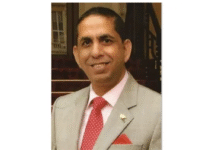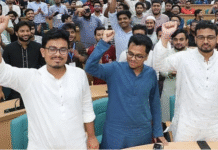
(Bangladesh Jammat-e-Islami activists throw bricks as they clash with police in Dhaka February 12, 2013. REUTERS/Andrew Biraj )
One night in February, Rajib Haider was set upon near his Dhaka home by five knife-wielding youths. His face was so lacerated that a relative who found the body wasn’t sure it was him until he called Haider’s cellphone and heard it ring inside a pocket.
Haider was a blogger, one of hundreds in Bangladesh demanding the death penalty for Islamist leaders accused of wartime atrocities, whose grisly murder swelled the crowds at student-led rallies many hailed as a “Bangladesh Spring”.
But now, a radical pro-Islam movement has emerged to counter the students it sneers at as “atheist bloggers”.
Known as Hefajat-e-Islam, it has given the government until May 5 to introduce a new blasphemy law, reinstate pledges to Allah in the constitution, ban women from mixing freely with men and make Islamic education mandatory – an agenda critics say would amount to the ‘Talibanisation’ of Bangladesh.
The clash of ideologies could plunge Bangladesh into a cycle of violence as the two main political parties, locked in decades of mutual distrust, exploit the tension between secularists and Islamists ahead of elections that are due by next January.
“This is a confrontation between secular and conservative orthodox interpretations of religion,” said Muhammad Zamir, a former career diplomat and now a newspaper columnist.
Source: blogs.reuters










Human Rights and Democracy 2012: Foreign & Commonwealth Office Report.Case study: Bangladesh – political violence : Forty years after independence, Bangladesh’s political culture remains confrontational and violent.
In 2012, NGOs estimate that 169 people were killed and over 17,000 were injured in political violence. The violence is not sectarian nor, generally, communal. Violence and vandalism have been an accepted means of political expression in a country where democratic institutions appear weak. There are no significant constraints on freedom of assembly, with frequent nationwide enforced strikes (hartals), many of which have resulted in violence and vandalism. The opposition allege law enforcement officials have used force during peaceful demonstrations. The victims are often innocent bystanders: for example, the elderly man burnt alive on a bus during an opposition enforced hartal, and Biswajit Das, a 24-year-old tailor, killed in front of cameras because he was perceived to be an opposition activist. (1)—-
Political participation is a crucial element of any democracy. The UK is committed to working with all stakeholders in Bangladesh to support the development of a stable, democratic, and prosperous society. The last parliamentary elections of December 2008 were acclaimed as an important step forward for Bangladeshi democracy, returning power to elected representatives. But the cyclical pattern of pre-election violence means that Bangladesh faces the prospect of worsening political violence in the lead-up to the next elections, due by January 2014. The British Government is supporting the Bangladesh Election Commission with its election security preparations; we are also helping civil society to track election-related violence, and mitigate this through community engagement. This is in addition to ongoing support to strengthen democratic practices and institutions, including parliament, and in addition to regular political dialogues in which we urge all parties to respect the rule of law. (2)—-
AL-HILAL says: April 17, 2013
As an ex colonial power, Britain , with its vast experience has a moral duty to put pressure on Bangladeshi government to respect human rights under all circumstances. Abduction of people has now become a political culture and most people are frightened of their life. British government and particularly the Foreign Secretary MUST be congratulated for speaking out about the abuse of human rights in Bangladesh. (3)
Hefajat has its democratic rights to come to the capital to put its demand to the government
We fervently hope that good sense would prevail and an isolated, desperate government would not unleashed its apostate bloggers to prevent Hefajat’s peaceful march in Dhaka to put its demand . It is their democratic rights to do so. If the govt allows its pest the bloggers to demonstrate on the same day to prevent/disrupt the Hefajat march then the government would be responsible for the consequence. We also hope the government would not this time close all the incoming transports to Dhaka to prevent the people join the march. Hefajat represent 89% of the Muslim people of this country and they are no body’s B team. To say so is an insult to the Islam loving Muslims in this country. Hasina must control her rabble rouser sycophant gangs from insulting & abusing Hifajhat. (4)